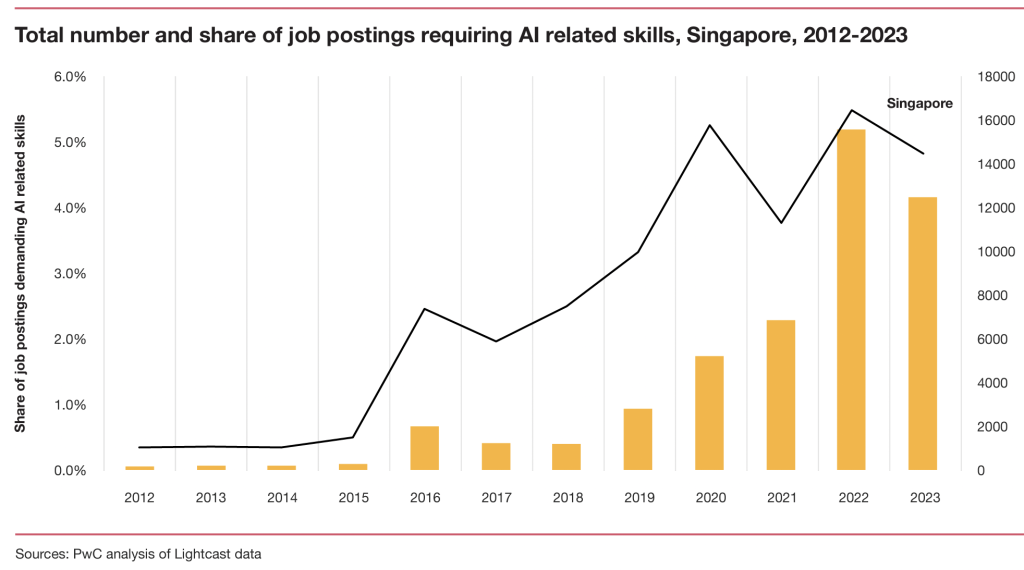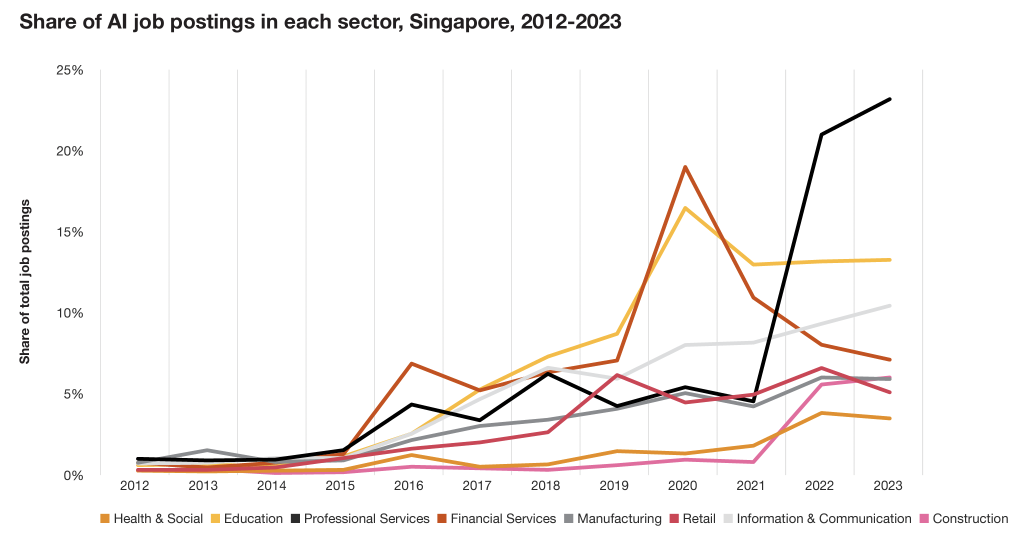PwC: Singaporeans with AI skills can earn up to 45% more in the same job. Here’s the list.
The latest PwC AI Jobs Barometer report shows that acquiring AI skills will boost your employment opportunities in an AI dominated future.

Disclaimer: Unless otherwise stated, opinions expressed below belong solely to the author. Presented data comes from PwC’s AI Jobs Barometer report published last week.
The primary concern of the AI-powered era that we were thrust into so suddenly in 2022 was that thinking computers will render millions of us jobless.
However, as it happens, it now appears that instead of mass unemployment, artificial intelligence is creating opportunities for us to make more money than before – provided that we can work hand in hand with it.
This shouldn’t be too surprising, considering that it’s the same phenomenon that was observed with every other technological breakthrough in the past, which automated many tasks away from humans.
We used to toil away in agriculture, then in heavy industries and now most of us occupy comfortable, air-conditioned buildings or even work remotely from home, while machines are doing all the hard work.
And, according to the latest PwC AI Jobs Barometer report, that’s the impact AI is having on our jobs today.
Findings from Singapore
Twelve years ago, back in 2012, only one in a thousand positions advertised in Singapore sought a person with skills in artificial intelligence — presumably engineers working in machine learning.
However, a decade later, in 2022, that number hit 50, i.e. 5 per cent of job postings in Singapore currently require AI-related skills, according to PwC analysis of Lightcast data (Lightcast is a global labour market analytics company).

This may not sound like a lot, but it adds up to between 12,000 and 16,000 vacancies, and these figures are likely to continue growing.
In fact, they already have in certain industries, with professional services seeing an especially strong surge, likely associated with the emergence of ChatGPT and generative AI tools, which are useful to non-engineers on a daily basis.
 Image Credit: PwC / Lightcast data
Image Credit: PwC / Lightcast dataAs of 2023, 21 per cent of jobs in professional services seek candidates with AI skills, but this impact is felt across the entire economy, even in fields like construction.
And it’s worth remembering that while these figures only show the numbers for jobs explicitly seeking competencies in AI, for those who do not, showing that you’re well-versed in AI-powered tools can be a welcome bonus that gets you ahead.
Speaking of bonuses…
Where’s the money?
The most interesting finding of the PwC report, and one which has been reported around the world, not only in Singapore, is that remuneration within the same professions is higher in postings seeking skills in artificial intelligence.
Following PwC, I have to preface the below by saying that the causal relationship between the two was not investigated, so we can’t accept it as perfectly accurate.
However, given the emerging pattern, it seems that either AI skills make you more valuable or that better, more innovative, forward-looking and successful companies are among the first looking to get the most out of AI and are able and willing to pay a premium to achieve it.
Either way, employees benefit.
Across the entire labour market in Singapore, PwC has found an average 7 per cent wage premium for jobs listing AI skills vs. those which do not, in the same profession.
However, as we know, some jobs may not yet use AI, which is why any broad average will be a poor indicator of what to expect.
In some occupations the skills premium crosses a 30 or even 40 per cent threshold, translating into tens of thousands of dollars per year:
| Occupation | AI Skills Wage Premium |
| Trade Brokers | +45% |
| Database Designers and Administrators | +35% |
| University and Higher Education Teachers | +34% |
| Systems Analysts | +28% |
| Financial and Investment Advisors | +13% |
| Financial Analysts | +11% |
| Real Estate Agents and Property Manager | +9% |
| Interior Designers and Decorators | +4% |
| Building and Related Electricians | +4% |
| Hand Packers | 0% |
Of course, this list is not exhaustive, as it would be difficult to present it across hundreds of different professions. But the patterns are clear: the smaller the exposure to AI, the lower the potential salary bump.
The highest premiums are observed in jobs dealing with numbers, where practical deployment of artificial intelligence can either radically improve financial outcomes (e.g. trade brokers and financial analysts) or improve performance and efficiency to reduce costs (like in IT).
Teachers in higher education have also observed a significant boost, likely because schools seek experts to pass knowledge to students and are willing to pay for their experience, which is essential to keeping university courses up to date.
Nevertheless, even if your job is not on the list or doesn’t necessarily fall into one of the top categories, most (if not all), white-collar careers will see a positive impact from the use of AI and may offer a smaller but not insignificant increment to your salary.
Even a 5 or 10 per cent increase will translate into thousands of dollars earned with skills you can practice using many resources available on the internet, helping you master tools like Microsoft’s Copilot, which are already making their way to your computers at home or work.
And if you’re looking for a job, it could be enough to make a difference between getting hired or not. There’s no reason to wait. Like the bosses of Nvidia and, recently, Netflix advised: AI won’t take your job but a human good at AI might. Don’t be the one left behind.

 Kass
Kass 
































